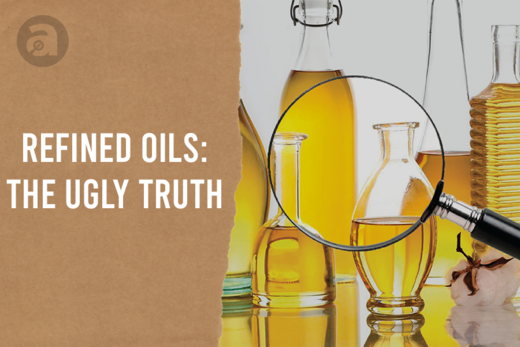
Refined oils: The Ugly Truth
Share
Refined Oil | Trans Fats | Palm Oil | List
The cheap refined oils you’re buying come at the cost of your health.
Oil plays a gargantuan role in our diets and kitchens. There are hundreds of oil products in the market. In such a situation it becomes hard to decide on something, without gravitating towards the oil with a name so deceiving it almost sounds like liquid gold.

Refined oil is often advertised as a gateway to good health. We see a flashy show of a person struggling to function. However, they suddenly start living their best life as soon as they start using said refined oil. While refining might mean purifying, the process of refining oil isn’t as appealing. The crude oil is acid-treated, or bleached. It is also neutralised, filtered, or deodorized all of which require the use of chemicals. PUFAs that don't maintain up to elevated temperatures are generated during this process.
Why did we start consuming Refined oils?
And why should we stop now!
Oil is an important ingredient in our food but why is refined oil widely consumed in comparison to other oils even though it is harmful to our health?
The answer is:-
- Refined oil is priced lower in comparison to organic and cold-pressed oil
- It is consistent in terms of colour and odour
- It has a longer shelf life
- High budget advertisement
Unhealthy Trans Fats
These oils oxidize and become fats when extracted from the plant. Trans fats, or trans-fatty acids, are a form of unsaturated fat. It is agreed upon by doctors all across the globe that trans fats should be avoided. This is because artificial trans fats may increase the risk of heart disease. Many studies link the consumption of trans fats to cardiac diseases.
Being aware of the negative impact of refined oil on the body, the question is –
Why did the production of refined oils start?
In the initial times of oil production, extraction was done by the natural method of cold pressing however there were many seeds such as soya bean, corn, sunflower seeds, canola, etc whose oil cannot be extracted using the technique of cold pressing. As these oils were in increasing demand, machinery was set up to chemically extract oil from the seeds. Since this process required less time and could be mass-produced, the technique soon spread to the production of oil from other seeds such as groundnut, sesame which were earlier cold-pressed. This resulted in higher quantity rather than quality.
Quality vs. Quantity

However, for any consumer one would prefer quality-based food which is why this introspection is a must. Just think of the price of 1-litre peanut oil and the price of its core ingredient 1 kg peanuts. This is because refined oil has low-quality constituents whose contamination cannot be checked with naked eyes resulting in cheaper prices on the cost of affecting your health. On the contrary, the cold-pressed method quality can be verified easily.
Moreover, the refining process involves exposure to high temperatures. This destroys all the natural and nutritive elements from the oil. While cold-pressed involves the minimal rise in temperature, thus preserving essential nutrients.
Therefore to secure our health we need to make a quality-based selection rather than quantity-based.
Adulterant Palm Oil
You would be astonished to know one of the adulterants which are mainly used is palm oil. Palm oil constitutes 40-50% of refined oil and palm oil has a very high content of saturated fats which are extremely harmful to our health. We are consuming it every day and night without being aware of it. Oils that are easily available at a cheap rate such as palm oil, cottonseed oil, etc are mixed with other oils for increasing the production by very low investment, leading to higher profit for the manufacturers and the loss of your health.

This oil contamination practice is commonly known as oil blending which is happening across the industry. It is highly commercialized and even the regulating bodies such as FSSAI do not curb this practice. This commercial pattern has dominated the market despite the hazardous effects it has on health.
Listing Refined Oils
Many refined oils are unhealthy. Following is a list of some commonly used refined oils.
- Cottonseed Oil
- Palm Oil
- Coconut Oil
- Safflower Oil
- Sunflower Oil
- Corn/Soybean Oil
- Olive Oil
- Canola Oil
- Rapeseed Oil
- Grapeseed Oil
To Summarise
We require fats to stay healthy which is why you and your loved ones should switch out refined oils for oils that are cold-pressed and produced with the consumer’s health in mind. At Anveshan oils are made with the utmost care and without the use of chemicals or heavy machinery which could lead to loss of nutritional content, instead we prioritize your health and bring you high-quality oils with the promise of good health.












 You saved ₹-48 on this order
You saved ₹-48 on this order